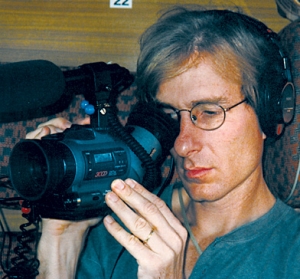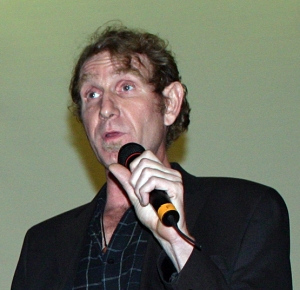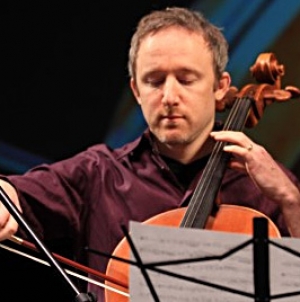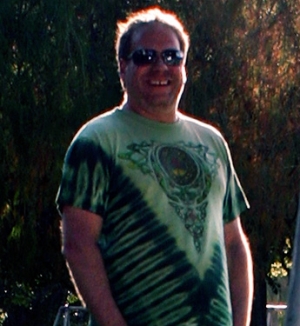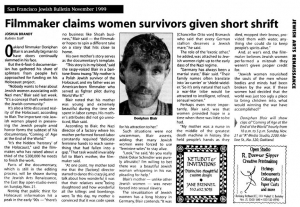Nicholas Blair
The executive producer and co-director of "Our Holocaust Vacation," Nicholas Blair was also the principal camera person and editor.
Born in New York City 1956, Nicholas became interested in photography at a young age and studied it both at the progressive Dalton School and St. Anne’s High School in Brooklyn. After traveling extensively in South America and India, he went on to obtain an MFA in photography from the San Francisco Art Institute in 1981 and began a career teaching fine art photography as well as exhibiting and selling prints.
In 1985, he was given the opportunity to photograph and assist a documentary film crew covering the Ethiopian famine for the development agency CARE. That humbling experience and his emerging awareness of the power moving images to influence people inspired a career change from still photography to documentary cinema, which he returned to New York City to persue. After apprenticing for four years, he began working as a director of photography in the late 1980's.
Since that time has traveled to over 50 countries in Africa, Asia, Europe, and South America and worked for a multiplicity of organizations including the Peace Corps, UNICEF, the relief and development agency CARE, the National Geographic Society, MTV, Nickelodeon, VH -1, Fox Television, WNET, the Metropolitan Museum of Art, the Shoa Foundation, the Pearl Lange Dance Foundation, the History Channel, A&E Television, Discovery Television, HBO, and PBS. Although primarily a director of photography, he has produced a number of documentaries, most notably American's Culture of Crash, a 52 minute documentary about the sport of demolition derby which was shown on The Learning Channel in 1997 and won the World Fest Houston Bronze Medal Best Independent Video. Our Holocaust Vacation is his second feature length documentary.
He has received grants from the National Endowment for the Arts in 1984, the New York Foundation for the Arts in 1990, and the Jerome Foundation 1999. His still photographs are in the collections of the Metropolitan Museum of Art and the International Center for Photography in New York City, The Brooklyn Museum, the Bibliotheque National, Paris France, and the Museum of Fine Arts, Houston Texas. He currently lives with his wife and two children in the Morningside Heights neighborhood of Manhattan.
Doniphan Blair
Doniphan Blair began "Our Holocaust Vacation" as a research project in the late 1980s and went on to scout the project, write its shooting script, including the performance pieces, do some camera and editorial work, and compose half the music.
Born in 1954, Doniphan was painting and making films by the time he got to high school. He spent much of his twenties backpacking around the United States, Asia and South America, often stopping to live with locals or work on projects. Notable among the latter was founding an artist’s commune in San Francisco (1975), joining a theatre collective in Peru (1980) and in 1980 making a short feature film in Brazil with renown Brazilian photographer Mario Cravo Neto. He studied film at the San Francisco Art Institute, graduating in 1990.
In the course of his adventures, Doniphan developed an interest in the “difficult idea.” Originally focusing on mysticism and tribal societies, he soon graduated to the Holocaust. Despite his mother’s quiescence on her experience, he realized that her suffering triggered intense feelings and anger.
He devoted a decade to researching it, reading extensively, studying at the Holocaust Center of N. California and New York’s YIVO Institute, attending conferences and classes, interviewing his mother and other survivors and writing an article, Bruno Lowenberg: A Holocaust Survivor, which won a North-West Journalism Award (1984). He also continued publishing on other subjects like Tobias Schneebaum: Becoming the Wild Man (1985), Drug War Delusions (1991), The Evolution of Capitalism and Advertising (1994) and various articles on film/video (2006-onoging).
One of Doniphan's initial insights into the Holocaust was that the camps were not ruled solely by natural selection, or “survival of the fittest,” as the Nazis intended. It was his mother’s story of an innocent young woman working as a nurse, not fighting for every scrap and depending on friends that compelled him to conclude that “sexual selection,” Darwin’s second theory governing reproduction, played a critical role.
Doniphan’s focus remained on film and video: studying for his degree, working on commercial productions (sometimes with his father, a lighting cinematographer) and producing his own pieces. He completed various dramatic, documentary and non-narrative shorts: Cancer in the Tropics, 1986 (32 min, 16mm, shot in Brazil and shown at various Latin American festivals), Job, 1988 (20 min video, winner of an award from the 1989 SF International Film Festival), Home Movie, 1990 (20 min, 16 mm, drama) and Talk No Show, 1991 (24 min doc on phone sex workers bought by the San Francisco Human Sexuality Institute). He also collaborated his brother, Nicholas, on America’s Culture of Crash, 1996, a documentary about demolition derby.
With the birth of his daughter, Irena, who went on to star in "Our Holocaust Vacation," Doniphan embarked on a graphic design career while continuing film, video and writing. He started A Media, his own studio, in tandem with his brother’s video production, a sister studio in New York. Over the years, he has created a wide variety of graphics, branding, cartoons, photography and copy for nonprofits and entrepreneurs alike: from city-wide AIDS prevention and recycling campaigns to architectural banners for Oakland’s African American Museum or the film/video magazine, CineSource.
He still keeps his big ideas folder full: a Multicultural Institute for Oakland, essays on Darwinism and Religion or The History of Sufism and various film projects. He and his brother are currently working on their next documentary, "Heaven and Hell," about a commune, and "The Women’s Side of War," themes which are addressed in "Our Holocaust Vacation." He currently resides in Oakland, California.
Moses Sedler
Moses Sedler composed the orchestral half of the film's music including the stark but moving "Auschwitz Suite."
He is a composer of music for dance, film, and concert stage. He is also a cellist, performer and music teacher. Moses has a background rooted in classical music, as well as improvisatory music, eastern European folk music, and Indian music.
As a cellist and composer Moses has been participating with modern dancers and choreographers in the San Francisco Bay Area for over ten years. Moses has collaborated with Alonzo King's Lines Ballet several times, including his composition "String Trio", he has also performed with Pharoah Sanders in the improvisational piece for Lines Ballet titled "Three Stops On The Way Home".
As a performer Moses has played in Europe, Israel, and North America, and has performed, recorded with and composed for the award winning ensemble DAVKA; a cello, violin, percussion and woodwind ensemble. DAVKA creates new music drawing source material from eastern European Jewish folk music, as well as Middle Eastern and Balkan rhythmic language, with composition and improvisation structures similar to modern jazz.
Some highlights of the past few years include a collaboration with choreographer Yannis Adoniou, creating the music for a two hour production called "Conversations". This piece involved San Francisco dance company Kunst-stoff, and the ProXsima dance company from Athens Greece. Conversations received its European premier in Athens, then was performed in San Francisco as the center piece of Summerfest Dance.
Moses then went on to work with choreographer Janice Garrett to compose a five-movement work scored for string orchestra. The piece titled "Brink" was premiered in San Francisco at the Cowell Theater.
Other highlights include composing for a number of documentary films, and working with Davka and Kitka in a performance filmed for a PBS television special. The broadcast featured several compositions from Moses. The feature was aired in late 2006 and continues to be aired on PBS stations throughout the country.
Richard Ogden
Richard "Dickie" Ogden produced, mixed and played drums on the rock sections of the OHV score. Working with composer Doniphan Blair, he helped shape the sound and finetuned the final product.
A seminal part of the San Francisco post-punk scene, Ogden started as a guitarist in his home town in upstate New York but moved to drums eventually mastering virtually all genres from jazz to rock and art music. Working with bands like MiRthkon and the post-modern composer Wally Scharold, or the noise-pop band Neflwurrzl, and running a studio on Telegraph, he was an important player until his 2010 departure to raise his young son in New York.
He is continuing to produce projects there with his wife Patty, a piano player, under there logo OdgenPark.
Press and Comments
"Our Holocaust Vacation" did not garner much press because it didn't place in any Jewish Film Festivals, and appeared in only a few other festivals, like the Miami Women's Festival. Nevertheless, a number of scholars, survivors, and educators loved the film, viewing it when it was shown almost 400 times on PBS, nation-wide, as well as at schools and Holocaust association gathering. And there was some press, see the Jewish Community Bulletin piece below. Here's a selection of comments:
"Our Holocaust Vacation" is a wonderful film! I found it powerful and moving to watch—and yes, sometimes even funny. I feel that it expresses extremely well both the sadness and complexity of our survivor parents' lives and the complex feelings and desires that we ourselves feel as children of survivors. - June 2011
It is one of the best Holocaust films I have seen. The film challenges genre conceptions and it challenges the audience. - October 2008
Elaina Viola, Masters Degree, Holocaust Film Studies, UCLA
Director Film Series, Grace Cathedral, San Francisco
Assistant to the Director Steven Spielberg during the making of 'Schindler’s List'
The film was very moving, full of tears, some humor and above all, the love of a family which has the guts to go for a deep emotional experience. - June 2009
National Association of Jewish Child Holocaust Survivors
I have been teaching high school social studies for 16 years and recently did two seminars at the Holocaust Museum. “Our Holocaust Vacation” was good because the daughter brings a current teen’s perspective to what happen 60 years ago. When you talk about the Holocaust there is a lot of depressing content. “Our Holocaust Vacation” has that but that is not the focus. It is more a family story: you can liken it to an orphan trying to find out about their family. - May 2010
My Ode to the Film:
Oh Yes! The guinea pig and the snail (two animals that figure in the film),
Then this must have been real.
But the woman was so forgiving and seemed so blessed,
funny how I remain so distressed.
You mean they paraded emaciated men naked?
Leading them like two-year olds?
Umm—and remember that train ride?
Two weeks no water, no food?
That defies logic, that defies Satan.
But in order to overcome, her only choice was to return,
Even to the place where the bodies burned.
Yes that's right, they show and tell, guinea pigs and snails,
as they toured along the rails—you see they are not so frail.
Amen - May 2011
Oakland filmmaker Doniphan Blair is an awfully big man to doors continually slammed in his face. But the 6', 5" documentarian has gathered his share of splinters from the people he's approached for funding.
"Nobody wants to hear about Jewish women associating with Nazi men," Blair said last week, "It's a concept verbotten in the Jewish community... Its the hidden 'Herstory' of the Holocaust."
His own mother's story serves as the documentary's template. Blair noted that his mother was young and extremely beautiful... attributes that did not go unnoticed. Blair's mother—unlike other Jewish women—was never forced into sexual slavery (but) the sexualization of Jewish women has long history in Germany... It was Chancellor Otto von Bismark who said that every German stallion deserves a Jewish mare.
"Germany has always been a martial state," Blair said. "Their women's names often translate into 'ax-carrier' and 'sheild=bearer.' It's only natural that such a war-like tribe would be attracted to intelligent, refined and sensual women. Even more importantly, Blair said, women provided hope were there was little to be had.
"My mother was a nurse in the greatest death machine in history. She held people's hands as they died, mopped their brow..."
"At the end of the war, Jewish women nourished the souls of the men whose bodies and minds had been broken by the war. If these women had decided that the world was just too ugly a place to bring children into, what would have winning the war accomplished?"
Joshua Brandt, writer
San Francisco Jewish Bulletin; 11/1999
Intro
 For one scene, Irena and the filmmakers went into Auschwitz at night.When sixteen year-old Irena goes on a family vacation to Poland, she didn't think it would be so heavy. Sure, her grandmother Tonia, who survived the Holocaust, is on the trip, and they will find out about her experience, but her father and uncle are also making a movie.
For one scene, Irena and the filmmakers went into Auschwitz at night.When sixteen year-old Irena goes on a family vacation to Poland, she didn't think it would be so heavy. Sure, her grandmother Tonia, who survived the Holocaust, is on the trip, and they will find out about her experience, but her father and uncle are also making a movie.
Welcome to "Our Holocaust Vacation," three generations on a roller coaster ride into history and family, produced, shot and edited by family members Nicholas and Doniphan Blair.
Called “one of the best Holocaust films I have seen” by Holocaust film scholar Elaina Viola, "Our Holocaust Vacation" has been shown over 375 times on PBS across America and at many schools and survivor associations. Now the filmmakers have added the "Our Holocaust Vacation" curriculum guide, the "Be Happy" poster, and the Juman Project, which continues the film's discussions of post-Holocaust Judaism, mysticism and politics.
"Our Holocaust Vacation" follows two teenage women pushed into the realms of the psychopath: Tonia during the war, who recounts her experiences with dignity and passion, and her granddaughter Irena, who is compelled to relive it, if just a little. For example, she goes at night with her dad and uncle into Auschwitz to film. In fact, the filmmakers break the barrier of regular movie making with their subjects and the citizens of Eastern Europe by staging some performance pieces, from walking with Jewish stars in a German town to giving away bread in Czech Republic.
“The film challenges genre conceptions and it challenges the audience,” explains Viola. This is why, perhaps, "Our Holocaust Vacation" was not accepted by major Jewish film festivals. Or perhaps it is because Tonia flirts with a German officer in a work camp, a story becomes the emotional climax of the film's many stories about the woman's side of war.
"Little acts of kindness kept us alive," says Tonia, who provided that kindness, as a nurse in the besieged ghetto hospitals, and received it: getting gifts of food from good Samaritans, falling in love with a young man on the way to Auschwitz.
No, Irena does not want to put on a Jewish star and march with her family through a German town. Yes, it seems abusive for her father wants her to do so or to take her into Auschwitz at night. But she comes to her own understanding as does her grandmother. Tonia telling her stories of love, healing and resistance to brute force and horror, right on the historical spots where they happened, proves cathartic.
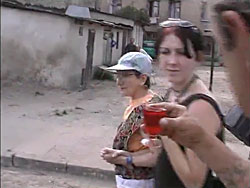 The family is offered a drink in the neighborhood where the Lodz Ghetto stood."The film was very moving, full of tears, some humor and above all, the love of a family which has the guts to go for a deep emotional experience," noted Ester Widman, of the National Association of Jewish Child Holocaust Survivors.
The family is offered a drink in the neighborhood where the Lodz Ghetto stood."The film was very moving, full of tears, some humor and above all, the love of a family which has the guts to go for a deep emotional experience," noted Ester Widman, of the National Association of Jewish Child Holocaust Survivors.
"Our Holocaust Vacation" provides a template for how one family healed and how humans can comprehend such history. Because of the presence of the teen character, the film is an good introduction to the subject for young people and has received high ratings from educators. The innovation of the "Our Holocaust Vacation" is continuing into the Juman Project, which is presented in multiple formats and is highly recommended for Jewish or historical awareness events, seminars or classes.
"Our Holocaust Vacation" is also available is a:
• Our Holocaust Vacation DVD: 84 and 58 minute versions
• Our Holocaust Vacation Curriculum Guide
• Be Happy, Be Happy: Poster and Fine Art Signed Seriograph
• The Juman Project: Mysticism, Religion, Science, Politics and Music in the Post-Holocaust Era
